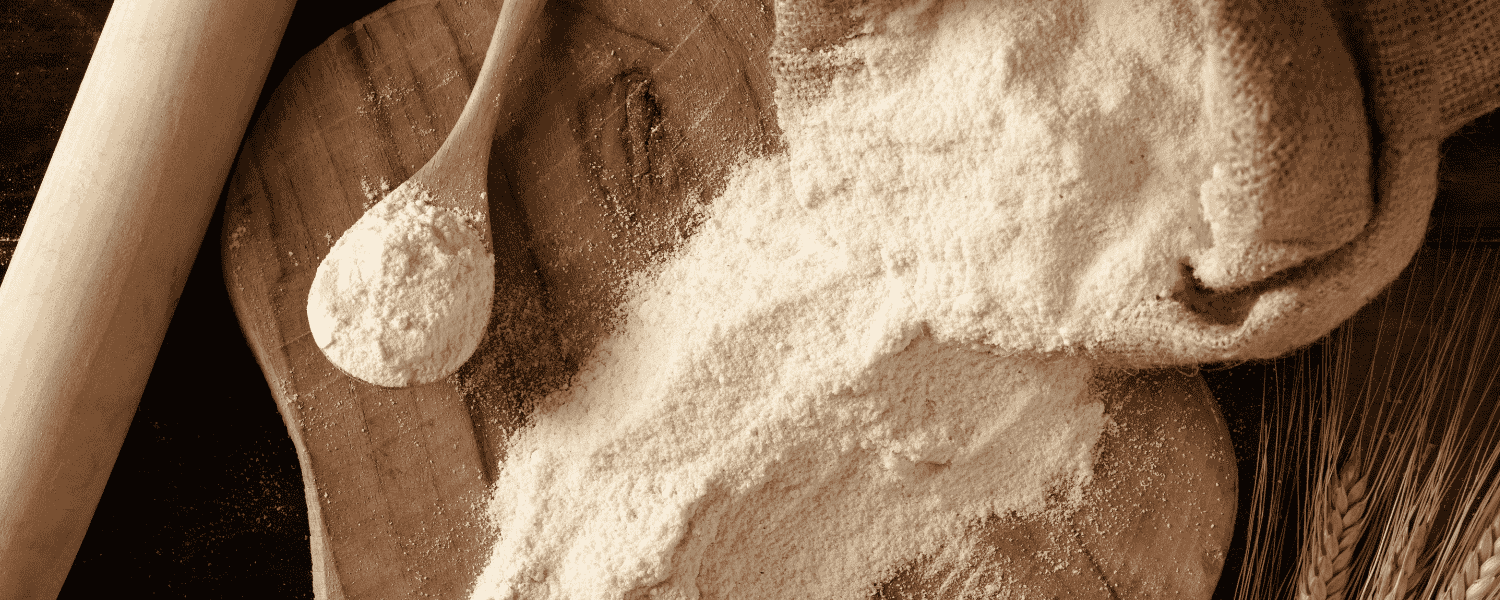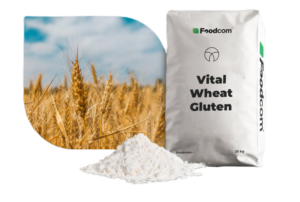In food production, the quality and functionality of the raw materials used is of crucial importance. One of the most versatile components with a wide range of applications in the food industry is vital wheat gluten. Although many associate it mainly with bakery products, its use goes much further – from the production of pasta and ready meals to dietary supplements and vegan products. What is worth knowing about this raw material, why is it so valued and where to buy vital gluten in good quality?
What is vital wheat gluten?
Vital wheat gluten is a concentrated wheat protein obtained from wheat flour. It is produced by washing out the starch and other water-soluble components from the flour and then drying the remaining protein fraction. The product is characterised by a very high protein content (about 75-80%) with a high biological value and a specific amino acid composition. Gluten is in the form of a light yellow powder with a neutral taste.
The gluten proteins are in particular high-molecular-weight glutenins and low-molecular-weight gliadins, which, after hydration, are responsible for the elasticity and resilience of the dough. High-quality vital gluten thus exhibits excellent visco-elastic-binding and texturising properties. As a result, it is readily used in various branches of the food industry. Manufacturers value it not only for its functional qualities, but also for its relatively simple application in mass production.
Use of vital gluten in the food industry
Vital gluten finds its use where its functional properties are desired – especially in industrial baking and the production of high-protein foods.
Industrial baking
In bakers and confectioners, vital wheat gluten is an indispensable addition to flours with a lower protein content. Its presence increases the strength of the dough, improves the volume of baked goods and extends their shelf life. Gluten is used in the production of mixed breads, wholemeal breads, rolls and frozen products.
Production of vegan meat substitutes
Vital gluten is the main raw material for the production of seitan – a plant-based meat alternative. In addition, its texturising effect and high protein content provide plant-based products with the right structure and nutritional value. Gluten is therefore an important ingredient in plants producing plant-based foods: chops, burgers, sausages and ready-made vegan dishes. Its use facilitates the imitation of the taste and texture of specific meats, as it enables the formation of fibrous structures in meat analogues.
Processing of pasta, dumplings and ready meals
Thanks to its gluten-binding properties, vital gluten improves the elasticity and shelf-life of products such as pasta, dumplings, noodles and delicatessen products. It improves their firmness and heat resistance, significantly reduces the risk of the products disintegrating during cooking and influences their stability during freezing or refrigeration. It is also used as a thickener in soups, sauces and preserves.
Dietary supplements
High-protein components of plant origin are increasingly used in the supplement industry. Thanks to its concentrated vegetable protein content, vital wheat gluten is used in the production of protein bars, protein supplements, shakes and other articles with increased protein content.
Feed industry
Vital wheat gluten is used not only in the production of human food, but also in animal feed. It improves both their nutritional value, digestibility and texture, as well as their appearance. Gluten is used in the production of livestock feed and pet food.
Technological benefits for manufacturers
Gluten is an ingredient that is natural and safe for consumers, but its use can be controversial. Why use gluten in food production after all?
- increase in production efficiency – vital gluten increases water absorption, which reduces the unit cost of the product while maintaining quality; it also has a positive effect on dough rheology and minimises production losses;
- improved sensory parameters – provides better texture, elasticity and volume of the final product;
- stability during storage and thermal processing – gluten does not lose its properties during freezing, pasteurisation or cooking;
- clean composition – vital wheat gluten is an ingredient in line with the ‘clean label’ trend.
How to choose vital gluten and where to buy the raw material for food production?
For producers looking for a reliable supplier, a recommended solution is to buy vital gluten from a wholesaler specialising in the supply of food raw materials in the B2B sector. Such a trusted partner could be FDCM.eu – a company with a shop for food raw materials in industrial packaging.
The company also offers free product samples, which is particularly important at the stage of technological testing or implementation of new recipes. Not every vital wheat gluten is identical – the degree of hydration and the level of protein activity, among other things, are important. It is worth testing a given raw material before implementing it in a specific application, as a given application may require different parameters.
For food manufacturers looking for a functional and efficient raw material with a wide range of applications, vital gluten is a must. It is not only used in baking, but also as a valuable protein in the delicatessen industry, vegetarian food production or supplements. The high quality of the ingredient will ensure reproducible production parameters and ease of application, making vital gluten an ideal component for industrial use.







